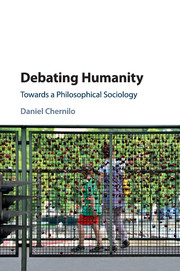References
Published online by Cambridge University Press: 07 June 2017
Summary
- Type
- Chapter
- Information
- Debating HumanityTowards a Philosophical Sociology, pp. 237 - 254Publisher: Cambridge University PressPrint publication year: 2017
- Creative Commons
- This content is Open Access and distributed under the terms of the Creative Commons Attribution licence CC-BY-NC 3.0 https://creativecommons.org/cclicenses/



